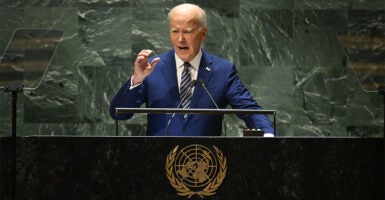If a teacher were grading President Joseph Biden’s third speech to the United Nations, he would earn a mediocre “meeting expectations.” He delivered the speech somewhat competently by his standards, clearing that exceedingly low bar. However, Biden seems to think, mistakenly, that his speech was the rallying call of a statesman:
I spoke before the U.N. General Assembly with a clear message: The road ahead is long and difficult. But if we persevere, we prevail. If we keep faith, we show what’s possible. Let’s do the work together, deliver progress, and bend the arc of history for the good of the world.
A statesman calls on others to act when they hesitate and inspires them to see the need to follow his lead. But Biden fell short.
Instead, he parroted clichés to the U.N. choir, completely in tune with the mainstream of Turtle Bay.
He stated, “We know that our future is bound to yours. And no nation can meet the challenges of today alone.”
He reiterated his commitment to the U.N., mentioning that the U.S. rejoined UNESCO (despite this being against the U.S. national interest). But he also declared that the international institutions must be updated to ensure “that we are delivering for people everywhere—not just somewhere—everywhere.”
He insisted that more perspectives and voices at the table are critical to modernizing these institutions. But what voices, in his mind? Developing countries that make up two-thirds of the U.N. membership was his answer. He called for expanding the Security Council and increasing resources for the World Bank and the International Monetary Fund and giving developing countries more influence within them.
This is, of course, what those countries want: more power, more influence, and access to financial resources. But expansion will make the Security Council less effective, not more effective.
Meanwhile, the World Bank and IMF already direct billions of dollars in financing to developing countries, contributing to the unsustainable debt that Biden acknowledged. Debt forgiveness or renegotiation can reasonably be proposed, but giving more voting power to developing countries will do nothing to make those institutions more effective.
Is it leadership to tell the assembled nations that you support what they want, even if it will not solve the problems that you identify?
He called for the U.N. to “govern” artificial intelligence to ensure that we “harness the power of artificial intelligence for good while protecting our citizens from its most profound risks.” The U.N. has a great appetite for control, but its judgment is often poor—just look at its response to COVID-19. Artificial intelligence is a legitimate concern, but skepticism is in order when the U.N. demands to steer.
He called for partnerships to address environmental protection, assist sustainable economic development, strengthen democracy, root out corruption, and reject political violence. How exactly? He gave few details other than saying the solution must involve many nations. Maybe giving everyone a seat at the table, as Secretary of State Antony Blinken loves to say, will spontaneously yield these solutions? Rhetoric will be abundant, positive results less so.
Consistent with recent administration efforts to mollify China, Biden downplayed tensions and was careful not to offend Beijing. “When it comes to China, I want to be clear and consistent. We seek to responsibly manage the competition between our countries so it does not tip into conflict,” he said.
“We are for de-risking, not decoupling with China. We will push back on aggression and intimidation and defend the rules of the road. … But we also stand ready to work together with China on issues where progress hinges on our common efforts.”
The reason for this was immediately clear. Biden sees what he calls the “climate crisis,” not China, as an existential threat. That part of the speech, highlighting U.S. spending and restrictions on fossil fuels, was one of two moments that truly seemed to energize Biden.
The other moment was calling on the U.N. and the assembled governments to support Ukraine. He rightly identified Russia as the cause of the war and stated that the U.S. and its allies would stand with the “brave people of Ukraine as they defend their sovereignty and territorial integrity and their freedom.”
While this moved the audience to applause, an open-ended commitment is not a plan or a strategy for winning. He would have been better served by detailing a plan for success. But his consistent failure of leadership in this area has contributed to growing skepticism in Congress and with the American public regarding his funding requests for Ukraine aid.
Nonetheless, it was the sole moment of applause during the speech until the tepid conclusion: “Thank you for listening. You’re kind.”
Overall, the speech was uninspired and uninspiring, soon to be forgotten, and a missed opportunity for the United States to demonstrate real leadership rather than reflecting platitudes back to the General Assembly.
Have an opinion about this article? To sound off, please email [email protected], and we’ll consider publishing your edited remarks in our regular “We Hear You” feature. Remember to include the URL or headline of the article plus your name and town and/or state.






























